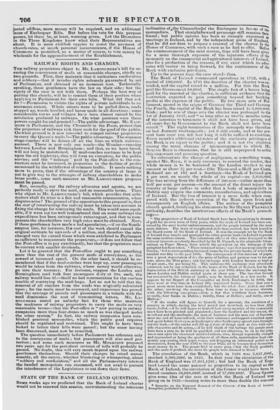RAILWAY RIGHTS AND CHARGES.
THE railway proprietors object to Mr. LABOUCHERE'S bill for se- curing the conveyance of mails at reasonable charges, chiefly on
two grounds. First, they maintain that it authorizes confiscation
and robbery—that it invades rights solemnly guaranteed by act of Parliament, and obtained at an immense cost. Technically speaking, these gentlemen have the law on their side ; but the equity of the case is not with them. Perhaps the best way of putting this clearly, will be to remind them of their position when
applying to Parliament for their own bills. What did they ask for ?—Permission to violate the rights of private individuals to an enormous extent. Whole streets were to be pulled down, roads stopped up, woods levelled, and havoc made in all directions: some considerable towns and villages have been almost ruined by the revolution produced by railways. On what pretence were these powers sought for and granted ?—The public advantage. Mr. E asr-
HOPE in Parliament, and the Chronicle in the Press, protest that
the projectors of railways risk their cash for the good of the public. On what ground is it now intended to compel railway proprietors to carry the Queen's mails ?—The public advantage. The common stage-coaches will be driven off all the lines on which railways succeed. There is now only one coach—the Wonder—running between London and Birtniugham ; and that, as we have heard, will not long be maintained. If mail-coaches continue to be kept upon the old highways, they will form an exception, for the public service; and the " mileage " paid by the Post-office to the con- tractors must be increased, in proportion to the decline of profits occasioned by the withdrawal of common traffic. It needs nothing
more to prove, that if the advantage of the country at large is not to give way to the attempts of railway shareholders to make large profits, some such measure as Mr. LABOUCHERE proposes must be passed. But, secondly, say the railway advocates and agents, we are perfectly ready to carry the mail, and on reasonable terms. Then why object to Mr. LAHOUCHERE'S bill, which provides that arbi- trators shall fix what is a fair and reasonable remuneration, when disputes arise? The ground of the opposition to this proposal is, that the cost of constructing the railway must be taken into account in
fixing the charge for conveying the mails. This would seem equit- able, if it were not too well remembered that on some railways the expenditure has been outrageously extravagant, and that to com- pensate the shareholders very high rates must be obtained. Now, if these gentlemen have made a bad speculation,—if on the South- ampton line, for instance, the cost of the work should exceed the original estimate by upwards of a million, and therefore the rates charged very far exceed those which were exhibited to Parliament as sufficient to remunerate the proprietors,—it does not follow that the Post-office is to pay exorbitantly, but that the proprietors must be content with smaller dividends.
Let it be granted that the Post-office ought to pay something more than the cost of the present mode of conveyance, as the reward of increased speed. On the other hand, it should be re-
membered that if the mail-coaches were kept up, some passengers would be taken from the railways, whose money would otherwise
go into their treasury. For instance, suppose the London and
Birmingham mail took four passengers daily at 30s. each, the railway would lose 61.—itself no bad renurneration for the costless
trouble of conveying the mail-bags. Let us not be told that the
removal of all coaches from the roads was originally calculated upon ; for the mails must be conveyed, and experience has proved
that the carriage of parcels and passengers in a vehicle with the
mail diminishes the cost of transmitting letters. Mr. LA- BOUCHERE stated an unlucky fact for those who maintain the readiness of railway proprietors to carry the mails on very reasonable terms—that the Post-office is "now paying to railway companies more than four 'times as much as was charged under
the other system." In fact, the railway companies have esta- blished practical monopolies, which the public good requires should be regulated and restrained. This ought to have been looked to before their bills were passed ; but the error having been discovered, must now be remedied.
The question immediately before Parliament has reference only to the conveyance ,of mails ; but passengers will also need pro-
tection; and some such measures as Mr. MORRISON proposed two years ago for the periodical revision of tolls will probably be passed. No doubt, this will very much depend upon the railway
gentlemen themselves. Should their charges be raised unrea- sonably, all the outcry, whether blustering or whimpering, about
" robbery and confiscation," and all the Parliamentary interest the banded monopolists can command, will not avail to prevent the interference of the Legislature to cut down their fares.


























 Previous page
Previous page